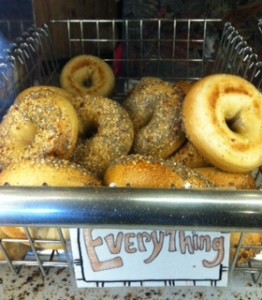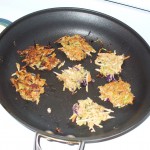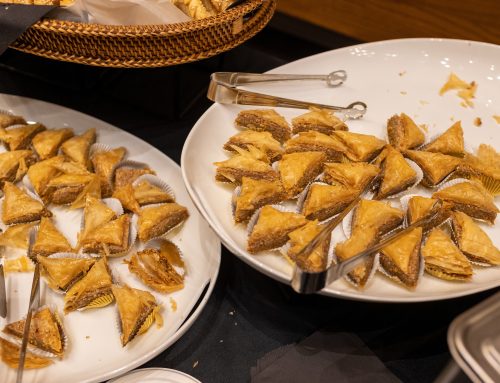
Do bagels mean everything? Photo by Hannah Pressman
Some say that Judaism’s essence can be boiled down to a bittersweet mantra:
“They tried to kill us. We survived. Let’s eat!”
A classically Jewish existential attitude, no? Persecution and pain are part of the Jewish people’s long history, but let’s look on the bright side: we’re still here! So why not celebrate with a bagel and schmear?
A Culinary Calendar
Although it certainly has its humorous side–and has provided at least one Jewish band with fodder for a snarky song about Jewish holidays–the “We survived. Let’s eat!” attitude reflects an all-encompassing religious-cultural worldview. On the most basic level, many holidays on the Jewish calendar involve a culinary component. From an anthropological perspective, food is an incredibly effective way to symbolize the seasons and reasons behind our celebrations. One of the most regularly occurring Jewish food rituals, combining crunchy salt with sweet challah on Friday evenings once Shabbat (the Sabbath) is underway, itself mimics Temple offerings in days of yore, even if we don’t actively think about it that way. Rosh Chodesh groups serve round foods to represent the moon; latkes commemorate the oil of the Hanukkah miracle; Tu B’shevat, recently marked by many through Tu B’Shevat seders, overflows with the symbolic abundance of various fruits and nuts.

Greasy latke goodness. Photo by Hannah Pressman
We Are What (and If) We Eat
Doubtless, Judaism’s food-friendly holiday calendar offers an easy–and tasty!–way to plug into the deeper meanings of the holy days. It also leads directly to our self-perception as an eating-centric people. The Jewish mother stereotype, explored skillfully in Joyce Antler’s study, is known for plying her children with food. Babies earn high marks from bubbes (grandmothers) for their luscious polkes (legs)–the child’s plumpness representing times of plenty, feast rather than famine. And perhaps it is this constant awareness that famine (or war, or other large-scale troubles) could always be around the corner that further solidifies the link between survival and food in the Jewish people’s psyche. Making it through another day with one’s family and peoplehood intact, after so much has threatened its existence, is reason enough to celebrate with some schnaps, herring, and sweet kichel cookies (my dad’s favorite way of celebrating just about anything).
New Global Perspective
All this is well and good. Yet I’d like to suggest that today, food and Jewish peoplehood has taken on a resonance beyond the particularistic marking of religious holidays and miraculous survival. The Jewish Food Movement has capitalized on this new interest in food’s impact on the environment, local sourcing of produce, sustainability, and concerns about the industrial food complex. The Jewish Farm School, Hazon, and other new initiatives are tapping into the Jewish food renaissance. Through CSA programs and farm partnerships, groups like Seattle’s Kavana Cooperative are turning food into an opportunity for local families to engage with social justice, environmental responsibility, and Jewish education in new and exciting ways. Food activism has taken off in Israel as well, suggesting that shared concern about sustainability might turn into a unifying goal for Jews around the world.
The connection between food choices and faith has never been stronger, but the difference now is that Jewish communities want to have their coffee cake and eat it, too–to turn the internally Jewish food fixation into something with universal meaning and broader social justice consequences. And to that, we can all munch some kichel and say, L’chaim!
Interested in further exploring the intersection between religion and food politics? Join the UW Stroum Jewish Studies Program for a conversation with Nigel Savage, founder of Hazon, and UW Professor Karen Litfin, an expert in environmental politics.
For registration information



![Muestros Artistas [Our Artists]: Bringing Sephardic Art and Community Together at the UW](https://jewishstudies.washington.edu/wp-content/uploads/2023/08/UWJS_Muestros-Artistas-cropped-500x383.jpg)



[…] A Bagel for Your Troubles on JewDub […]